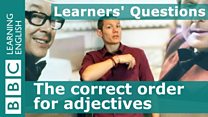Unit 7: English You Need
Exams, news, pronunciation, teachers' tips, learners' questions
Select a unit
- 1 English You Need
- 2 English You Need
- 3 English You Need
- 4 English You Need
- 5 English You Need
- 6 English You Need
- 7 English You Need
- 8 English You Need
- 9 English You Need
- 10 English You Need
- 11 English You Need
- 12 English You Need
- 13 English You Need
- 14 English You Need
- 15 English You Need
- 16 English You Need
- 17 English You Need
- 18 English You Need
- 19 English You Need
- 20 English You Need
- 21 English You Need
- 22 English You Need
- 23 English You Need
- 24 English You Need
- 25 English You Need
- 26 English You Need
- 27 English You Need
- 28 English You Need
- 29 English You Need
- 30 English You Need
Session 5
Welcome to Learners' Questions - the series where we answer your queries about the English language. What will this week's learner question be?
Activity 1
Learners' Questions
Worth
Roberto from Argentina says: Would you please explain the difference between these two sentences: This book is worth reading / It's worth reading this book.
Watch the video and complete the activity

Dan
No way! And then what did she do? Hold that thought. Hi guys! Dan from BBC Learning English here with this week's Learner Question. Find out what it is after this.
OK! This week's learner question comes from Roberto from Argentina. He says, would you please explain the difference between these two sentences: This book is worth reading / It's worth reading this book.
I've got good news for you. There is basically no difference in meaning between the two sentences. Both of them we are talking about the value of an object, in this case the book, and there's only a difference in form, both of which are used quite commonly.
Worth usually follows the verb to be and is followed in turn by an -ing clause. It often goes in sentences which begin with an it. For example, it's worth repairing the car.
We can move the object to the front of the sentence and use it as the subject, and then we don't need the it. For example, the car is worth repairing. And there's no difference between these two sentences.
Worth can also be followed by a noun phrase especially when we're talking about the monetary value of something. For example, this house is worth a fortune
We can use other expressions such as a lot or a great deal, etc. to talk about something's value in terms of its use. But this is not necessarily to do with money. For example, my sister is worth a great deal to me.
Finally, worth appears in lots of idiomatic phrases in English. For example, it's worth its weight in gold. It's not worth the paper it's printed on. For what it's worth, and, it's more trouble than it's worth. But in these cases the word order is fixed, so don't change them.
I hope that answers your question Roberto. Thank you very much for writing to us. If anybody else out there has a question for Learners' Questions, you can email us on: learning.english@bbc.co.uk. Please remember to include Learners' Questions in the subject box and your name and the country that you're writing from. We can't possibly answer all your emails, guys. I'm very sorry, we just get too many, but we do read every single one. And, for more information, go to our website: bbclearningenglish.com. I think that's it. Done? Done? Good. See you next time on Learners' Questions. Bye.
___________________________________________________________________
Did you like that? Why not try these?


 __________________________________________________________________________________
__________________________________________________________________________________
Summary
Worth
Worth usually follows the verb be and is followed by an ING clause. It's commonly used in sentences starting with it.
It's worth repairing the car.
It's worth studying hard at school.
In some cases we can move the object to the front of the sentence and remove the it.
The car is worth repairing.
We can also follow worth with a noun phrase – especially when talking about how much something costs or is worth.
This house is worth a fortune.
He's worth £25 an hour and no more.
Worth can be followed by other expressions too, such as a lot, a great deal etc.
My sister is worth a great deal to me.
Is it worth everything you own?
Worth appears in many idiomatic phrases:
It's worth its weight in gold.
It's not worth the paper it's printed on.
For what it's worth,I still think about you every day
It's more trouble than it's worth
To do
Try our quiz to see what you've learned about this topic.
Learners' Questions Quiz
4 Questions
Decide if these sentences are correct or incorrect
Help
Activity
Decide if these sentences are correct or incorrect
Hint
What verb form can come after worth?Question 1 of 4
Help
Activity
Decide if these sentences are correct or incorrect
Hint
If we move the object to the front of the sentence, what do we do with the 'it'?Question 2 of 4
Help
Activity
Decide if these sentences are correct or incorrect
Hint
Do we change word order in an idiomatic phrase?Question 3 of 4
Help
Activity
Decide if these sentences are correct or incorrect
Hint
What other expressions can we use after worth?Question 4 of 4
Excellent! Great job! Bad luck! You scored:
End of Session 5
Well, that's it for this unit! Join us again in Unit 8 for more Exam Skills, News Review, Pronunciation in the News, The Teachers' Room and Learners' Questions!
Session Vocabulary
Worth
Usually follows the verb be
Is followed by an ING clause or noun phrase
Can be followed by a lot, a great deal etc.
Appears in many idioms